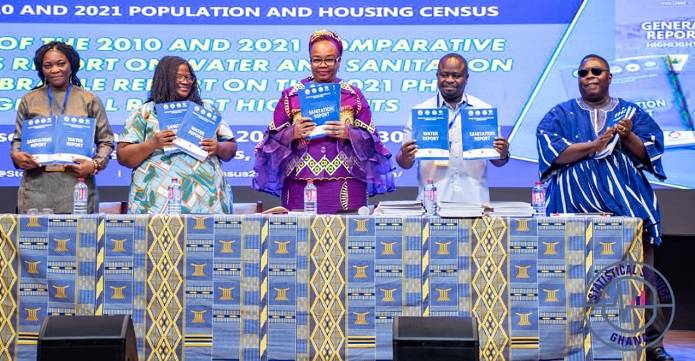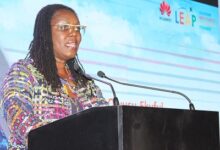
Ghana has recorded 1.6 per cent reduction in open defaecation between 2010-2021, the Government Statistician, Professor Samuel Kobina Annim has said.
The figure, he said was minimal following the 11 year period, stating that Ghana was likely to miss the universal target of ending open defecation by 2030.
The Government Statistician, was speaking at the release of the 2010 and 2021 Comparative Analysis Report on Water and Sanitation and Braille Report on the 2021 Population and Housing Census (PHC) General Report Highlights in Accra on Thursday.
The report which was a collaboration between GSS and the United Nations Children’s Fund (UNICEF) aimed to provide a comprehensive analysis of the current state of sanitation and water in Ghana based on the 2010 and 2021 PHC.
The Braille version, which is a maiden census report, was published in partnership with Ghana Blind Union (GBU) and is in audio and large prints to make it easy for people who have difficulty seeing to have access to the 2021 PHC report.
Prof. Annim said while the national level had seen an improvement of 1.6 per cent, there were some 70 districts out of the 261 districts that retrogressed and recorded increases in open defaecation in their jurisdictions over the period.
“Whilst in some other districts notably the Nandom district and some districts in the Upper West Region, we see improvement in excess of 50 percentage points over the 11 year period,” he added.
The Government Statistician indicated that, for Ghana to achieve the universal target, there was the need for stakeholders to step up effort and accelerate interventions in the water sanitation and hygiene sector.
“Definitely from the open defaecation point of view, our chances of ending it by 2030 is minimal, unless we accelerate interventions in the sector and as I indicated, the sector ministry has developed different scenarios, and this is the time we need to accelerate.
“Because if by 11 years’ period you have reduced by just 1.6 percentage points, and we have seven years to 2030, then clearly, we are not likely to achieve the target of ending open defaecation by 2030,” Prof. Annim stated.
He called on the Ministry for Local Government and Rural Development to engage the district chief executives that were recording improvements to share best practices with others whose districts were not doing well to help achieve the Sustainable Development Goals (SDG) targets by 2030.
The Government Statistician also urged the Ministry of Sanitation and Water Resources to take a re-look at its national targets on access to improved services.
The Minister of Sanitation and Water Resources, Dr Freda Akosua Prempeh, in a speech read on her behalf by the Director in charge of General Administration at the ministry, Patricia Dovi Sampson expressed the ministry’s commitment to ensure that all persons had access to safe and improved water and sustainable environmental sanitation in line with SDG Six.
A WASH specialist at UNICEF, Mrs Lorretta Roberts, called for right investment for Metropolitan, Municipal and District Assemblies, to enable it embark on its mandate to achieve the SDG target and ensure that each household had access to a sanitation facility.
The Executive Director of the GBU, Dr Peter Obeng Asamoah for his part, commended GSS for publishing the census report in braille version, stating that it was another milestone in the history of Ghana of making information accessible to all.
BY VIVIAN ARTHUR







